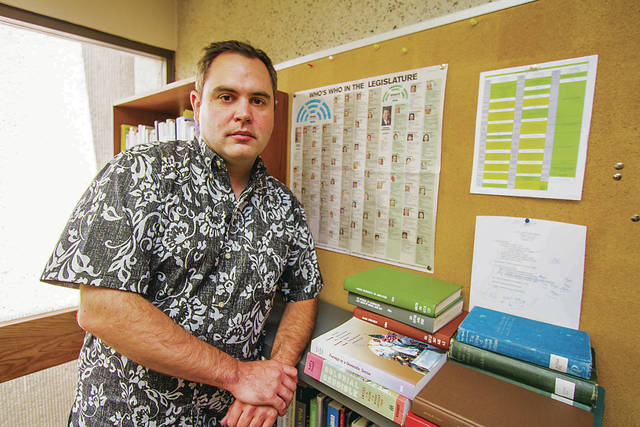Ranked voting, a new way to elect candidates for political office, could be coming to Hawaii if a bill making its way through the state Legislature becomes law.
In ranked choice voting, voters select several candidates, giving each a rank of 1, 2, 3, 4 and so on, with No. 1 being the voter’s first preference.
If one candidate is the first preference of more than 50% of the voters, she or he is elected outright. But if no candidate gets more than 50% of the No. 1 votes, the candidate with the fewest No. 1 votes is eliminated and those who voted for that candidate as their first preference have their second choice elevated to No. 1.
That process is repeated until one candidate gets more than 50%.
In 2018, Maine became the first state to use ranked voting, although 19 cities in the U.S. use it as well. Several countries, including Australia, New Zealand and Scotland, use ranked voting on a national scale.
Proponents say ranked voting can affect politics. Politicians tend to support a broader range of ideologies — which in turn produces more moderate politics — because they have a better chance at higher-preference votes if they appeal to voters across the political spectrum. Proponents also argue that it discourages negative campaigning.
Senate Bill 427 Opens in a new tab, which would establish ranked choice voting for special federal elections and special elections for vacant County Council positions, is moving through the state legislature.
SB 427, which passed through the House on March 28, would apply the voting format outside of regular elections, when an elected official leaves office in the middle of a term.
“I viewed it as kind of a pilot project,” said Sen. Karl Rhoads, who introduced the bill. “I also thought my more limited approach … is actually more important in those special elections, because a lot of times you get 30 people running, and that’s where ranked choice voting I think is most useful.”
The goal of using ranked choice voting is to ensure that elected candidates have some level of support from a majority of voters.
In Hawaii’s 2018 midterm elections, a number of candidates won the primary elections without a majority of votes. Congressman Ed Case won the Democratic primary election for Hawaii’s first congressional district seat with less than 40% of the votes cast.
Lt. Gov. Josh Green won the Democratic primary election for lieutenant governor with 30% of the votes, and Ron Curtis won the Republican primary election for U.S. senator with less than 20%.
Rhoads’ bill is one of a handful of ranked voting bills introduced during this year’s legislative session and would use the voting format in more limited circumstances than most of the others.
“I didn’t think, politically, people were ready to try it on all elections,” Rhoads said.
House Republicans have adamantly opposed the idea of ranked voting, fearing it would weaken the party.
Only five of the 51 state representatives are Republicans, and all are opposed to ranked voting.
In a March 1 press release, House Republicans targeted ranked voting and House Bill 210 Opens in a new tab in particular, a now-dead bill that would have used ranked voting in primary elections for partisan races.
In addition to the perceived threats to their party, House Republicans said ranked voting would be costly to implement and could potentially confuse and deter voters.
Hawaii usually ranks low in voter turnout and had the worst in the country during the 2016 presidential election.
Colin Moore, an associate political science professor and the director of the Public Policy Center at the University of Hawaii, said ranked voting would probably be helpful for Republicans.
“Generally ranked choice favors minority parties,” he said. “I don’t really understand the Republican opposition here. It’s always going to be tough for Republicans to win seats in Hawaii…but I don’t think ranked choice would hurt them.”
Moore also said that Republicans should not be worried about “strategic voters” who would vote exclusively for one party.
“That just doesn’t happen,” he said. “In ranked choice voting, most voters just vote their genuine preference. They’re not playing games.”
However, he said that ranked voting could have changed the outcome of the 2010 special federal election for Hawaii’s 1st Congressional District seat, which was vacated after former Gov. Neil Abercrombie resigned to run for governor.
Former congressman Charles Djou, who ran as a Republican and succeeded Abercrombie, won a three-way special election against former congresswoman Colleen Hanabusa and Case, who were both Democrats.
Djou received less than 40% of the votes, but the Democratic votes were split between Hanabusa and Case, who had about 30% and 27% of the votes respectively.
The other ranked voting bill going through the Legislature, House Bill 626 Opens in a new tab, would address that particular circumstance by requiring ranked choice voting to be used to fill a vacant U.S. Representative position.
SB 427 and HB 626 may have gone further through the state Legislature than any other ranked voting bill, Moore said, but he still doesn’t see them becoming law.
“One thing you can say about local elected officials is that they’re tremendously cautious,” he said. “They won it under the old system, and most of them don’t see the need to change the rules.”

